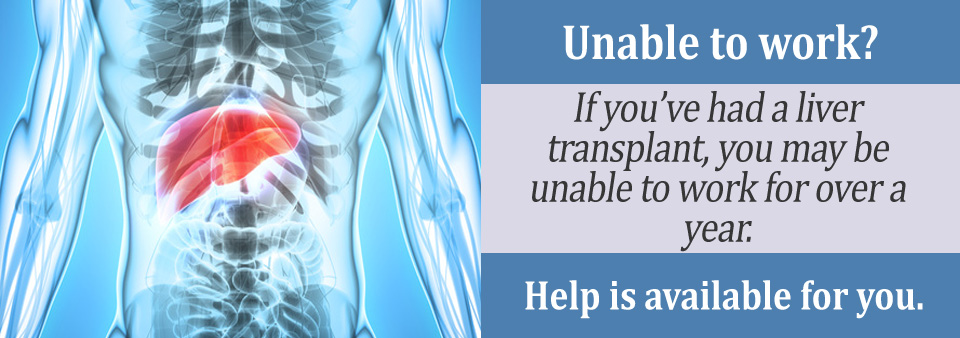33,000 organ transplants occur in the United States each year, with approximately 7,800 of those being liver transplants. While it typically takes six months to recover from this complicated surgery entirely, some patients need a full year to recover.
Survival rates for heart transplants have improved significantly with nearly 75% of patients surviving after five years and 50% of patients remaining alive after twenty years.
If you require a liver transplant and are unable to work due to your condition, there could be financial help available to you. The Social Security Disability Insurance (SSDI) program was created to assist those who have become disabled due to a life-limiting illness such as liver failure.
What Can I Expect From My Liver Transplant?
A liver transplant is a surgery done to remove a person’s diseased liver and replace with a healthy liver. There are three types of liver transplants:
-
Orthotopic transplant – The most common type of liver transplant, an orthotopic transplant takes the entire liver from a deceased owner to give to the recipient.
-
Living donor transplant – In this type of transplant, the donor is a living person who gives one lobe of his or her liver to the recipient.
-
Split type of liver transplant – A split donation occurs when a deceased donor’s liver is split into the right and left lobe and given to two people, usually a child and an adult.
A liver transplant is considered when all other options have been exhausted, and the person has developed end-stage liver disease (ESLD). Recipients are prioritized based on the severity of their illness.
Liver transplants are most often performed on patients with hepatitis, nonalcoholic fatty liver disease, cancer, alcohol abuse, viral infections of the liver, or hereditary conditions.
There are many risks associated with a liver transplant, such as infection, bleeding, cancer, and blood clots. However, the biggest risk is a rejection of the liver.
Patients who receive a liver transplant must take medications to prevent their immune systems from attacking their new liver.

What Symptoms of My Liver Transplant Qualify for Disability Benefits?
There is a range of symptoms that can be expected when you have a liver transplant, and they all might affect your ability to work differently. Here are some relevant facts about your application for benefits related to your liver transplant from the Social Security Administration (SSA):
- A liver transplant is one of the few conditions listed in the SSA’s impairment listing manual, or “Blue Book,” that meets approval for financial benefits with no additional criteria needed.
- A liver transplant is listed in Section 5.09 of the Digestive System in the “Blue Book.” It states that all liver transplant recipients will be eligible for disability for at least one full year from their transplant.
After the one-year anniversary of your liver transplant, the SSA will reevaluate you to determine if your illness continues to be disabling enough to keep you from working. You will be evaluated on what is called your “residual impairments.”
This means that you will be responsible for providing evidence of your health and your work capabilities as related to your health. The SSA will consider the following:
- How well you are functioning since your transplant, including a full assessment of all of your body systems.
- Health complications that may have developed in other parts of your body since your liver transplant.
- If you have had any rejection episodes and how often or severe they were.
- Any negative reactions that you may have had to treatments, such as adverse reactions to your immunosuppressant medications.
Anyone requiring a liver transplant will have had health problems before they undergo transplantation. It is probable that you will qualify for financial assistance through another section of the Digestive System.
For example, you will likely already qualify for benefits under Section 5.05, Chronic Liver Disease.
Do I Qualify for Benefits?
To be eligible for Social Security benefits, your medical records will need to show that your symptoms are severe enough to prevent you from working at a level which would support you. As discussed earlier, a liver transplant is a serious surgery that will qualify you for benefits for at least one year from your transplant.
What Information Will I Need to Provide?
When applying for Social Security, you may be asked to provide the following:
- Confirmation of your diagnosis from a Gastroenterologist, including progress notes and prognosis
- Surgical or pathology reports from liver biopsy
- Imaging tests related to your liver disease, such as ultrasound, CT scan, MRI, endoscopic retrograde cholangiopancreatography (ERCP), or any other related imaging
- Blood tests to examine the extent of which your liver is functioning such as ALT and AST, as well as blood clotting factors
- Inpatient hospital notes
- Progress notes from any other health care providers directly involved in your care such as rehabilitation specialists or psychologist.
What’s Next?
If you have end stage liver disease and require a liver transplant, you should contact a disability advocate or lawyer in your area. When your health is suffering, it can be difficult to know where to turn or what to do next.
A qualified attorney can help you navigate the Social Security application process, leaving you time to focus on what’s most important: your health.